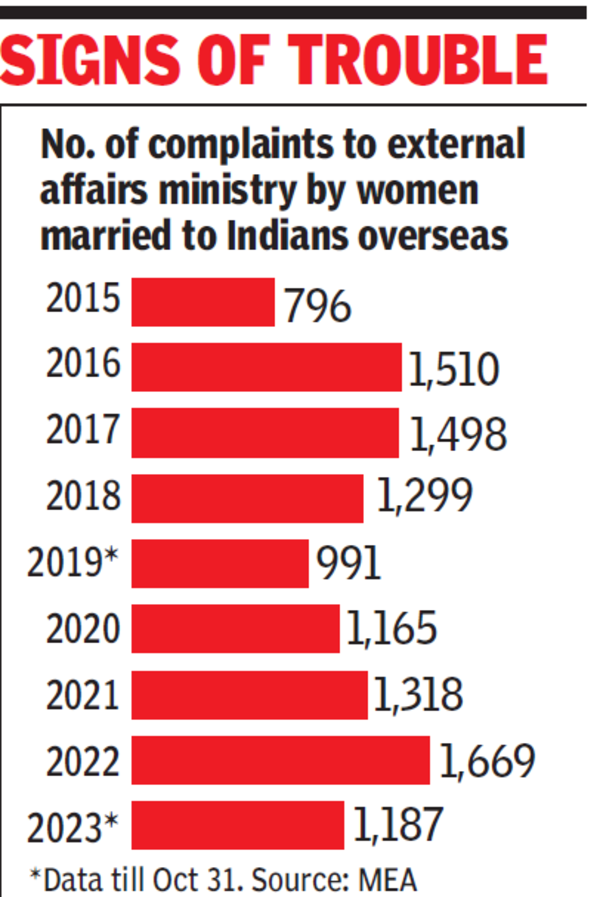
In its report on ‘Law on Matrimonial Issues Relating to NRIs and OCIs’ submitted last month, the Commission flags the lack of a central law to deal with NRIs. Sec.498A of IPC (cruelty by husband, in-laws) remains the only means NRI wives have of seeking action against their husbands and in-laws over domestic abuse. But the writ of Indian statutes doesn’t run in foreign jurisdictions, which are under no compulsion to deport an accused back home to face charges, the Commission says.
“Problems faced by Indian wives deserted by their NRI husbands”, therefore, need a tailor-made fix, it concludes after its analysis of the Registration of Marriage of Non-Resident Indians Bill, 2019. Tabled in Rajya Sabha, the proposed legislation was referred to the Commission in April last year.
Harassment, Fraud Big Issues
If an NRI son-in-law is quite the sought-after match for Indian girls, a wife from back home is seen as the ideal companion for a son settled abroad. But “intercountry marriages” between NRIs or OCIs and Indian citizens have fuelled a “rapid rise in legal issues”, the Commission says.
Harassment and abuse by the husband and his family, husband going incommunicado after moving overseas, failure to obtain maintenance and child support from the spouse, child custody, and request for extradition or deportation of spouse to India constitute the bulk of complaints filed by NRI wives, the govt had told Parliament in 2019. The Commission found that “deceptive practices like false assurances, misrepresentation, and abandonment are commonly associated with these fraudulent unions”.
Given the stakes involved in a shift abroad, there is an element of convenience that can sometimes drive such marriages. In Punjab, for instance, it’s not uncommon to come across matrimonial ads seeking IELTS-qualified brides with the prospective groom’s family promising to foot the bill for her studies abroad; a win-win since the bride gets to earn a foreign degree and her husband hitches a ride on a dependent visa to work abroad. Pragmatic as they are, such arrangements can end in desertion and allegations of fraud. In fact, Canada recently removed dependent visas for spouses of students in undergraduate courses to check the rampant use of this route to landing abroad.
What Law Commission Said
The 2019 Bill deals with the registration of marriages between NRIs and Indian citizens. And while instances of aggrieved husbands knocking on court’s doors for remedy are not unknown, the proposed law and the Commission’s suggestions are geared towards addressing the issues faced by Indian wives abroad. Among the provisions discussed are the impounding of passports and the serving of e-summonses and attachment of property of “delinquent husbands”.
But it begins with the need for a clear definition. To cast the net as wide as possible, the Commission says that an NRI should be defined as “a citizen of India, who resides outside lndia for any purpose whatsoever, save tourism”.
Such unions should be registered within 30 days of solemnisation, in India or abroad, with travel details and overseas residential address included in the paperwork. But since storing or updating of such information is not mandated by existing Indian marriage registration laws, the Commission says a separate central NRI marriage registry be created for the purpose. It adds that a photocopy of the passport of the NRI husband “may be pasted in the marriage register… before the marriage certificate is actually issued to the parties”.
It also suggests that the Passports Act, 1967, be amended to make it mandatory for holders to declare their marital status and link their passport with that of the spouse.
But what about someone who is an Indian citizen at the time of marriage and then moves abroad? For that, it circles back to the need to ensure the compulsory registration of all marriages in India, whether they are performed under statutory or personal laws.
As for divorce proceedings involving Indian wives abroad, it notes that if an Indian settled abroad marries in India, the marriage is to be governed by the Indian law under which they have married. If the parties have become foreign citizens and obtained a decree from a foreign court then the Indian court would apply rules of international law to decide the matter. The Commission says that the NRI marriage law should also cover aspects like child custody, rehabilitation, etc.
To ensure the appearance of spouses settled abroad during court hearings, the Commission says that the provision for serving of e-summons included in the yet-to-be-notified Bharatiya Nagarik Suraksha Sanhita, 2023 (BNSS), or the new CrPC, be extended to NRIs. It also wants the provision for attachment of the property of a proclaimed offender laid down in BNSS to cover NRIs.